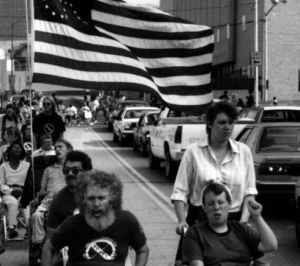31 Years After the ADA Became Law, It Is Time to Think Differently About Inclusion
 Today marks the 31st anniversary of the landmark Americans with Disabilities Act of 1990 (ADA). As we honor this historic legislation and the progress we’ve made since, we also find ourselves at a difficult and transitional time in the world. For children and adults with disabilities – who represent some 61 million Americans – there is no doubt they have been disproportionately impacted by the pandemic, especially when it comes to healthcare equity, education, employment, and financial stability. Further, for disabled people of color, these hardships are only compounded.
Today marks the 31st anniversary of the landmark Americans with Disabilities Act of 1990 (ADA). As we honor this historic legislation and the progress we’ve made since, we also find ourselves at a difficult and transitional time in the world. For children and adults with disabilities – who represent some 61 million Americans – there is no doubt they have been disproportionately impacted by the pandemic, especially when it comes to healthcare equity, education, employment, and financial stability. Further, for disabled people of color, these hardships are only compounded.
Even before the pandemic, people with disabilities were already at a societal disadvantage. Historically under-reported and discounted, the disability community has long faced discrimination in:
- Employment, with many employers not understanding the talent, skills and potential of people with disabilities.
- Healthcare, with limited access to quality healthcare and a lack of general understanding or training by the medical community to adequately support their unique needs; and,
- Society, with outdated and hurtful stigmas still rooted in the culture of our neighborhoods, schools and workplaces.
If we are to truly build back and move forward, we must ensure the people most affected by this tragic year receive the most support, with innovative, responsive and quality services and resources. Simply put, now is the time to urgently address these systemic barriers, once and for all.
Our communities are beginning to reopen, with many people starting to recover. For people with disabilities, the barriers to mend are much more complex and more urgent. To get to the core of these challenges, Easterseals commissioned Accenture to conduct a comprehensive national study to better understand COVID-19’s impact on the disability community. The findings are undeniable.
Take education, for example. Almost all children with significant disabilities (93%) have missed milestones due to the pandemic, compared to around half (54%) of their non-disabled peers. The first five years of a child’s life are the most critical time in their development, with these crucial years setting the trajectory of their entire lives.
People with disabilities are three times less likely to be employed, with this gap growing even wider during COVID. Additionally, the digital divide is acutely impacting people with disabilities. They are much less likely to use the Internet, have home access to broadband, or own a computer – the lifeline for all of us through this time.
Bottom line, if our communities do not properly address the inequities people with disabilities face during this emerging post-pandemic, it will have devastating short- and long-term consequences on their quality of life and wellbeing. Not to mention the negative and financial impact on society at large. Now, after 30+ years with the ADA, it’s time to reevaluate our approach to inclusion. Like any form of progress, critical gains don’t happen in one fell swoop – it’s going to take our continued effort, energy, and action to make our modern world more equitable, inclusive and truly accessible. We can no longer afford to look the other way and not recognize this important demographic of our society. We can, should, and must do better.
As a leading nonprofit provider of outcomes-based services, we are launching a comprehensive, nationwide strategic effort to modify, expand, and amplify our services to meet the very pressing and evolving needs of people with disabilities.
We cannot do this alone. We need employers, educators, government officials, community leaders, and local organizations to step up, drive solutions and do more to advance equity for all in our communities. Only when we do this together, will we ensure every single American is valued equally.







July 31st, 2021 at 8:13 am
We the member are the bady of aesterseals .We have the rigth to comment. Aboud aout trement by easteseals!!